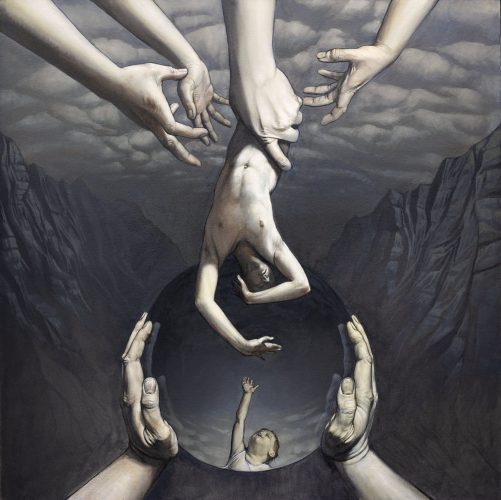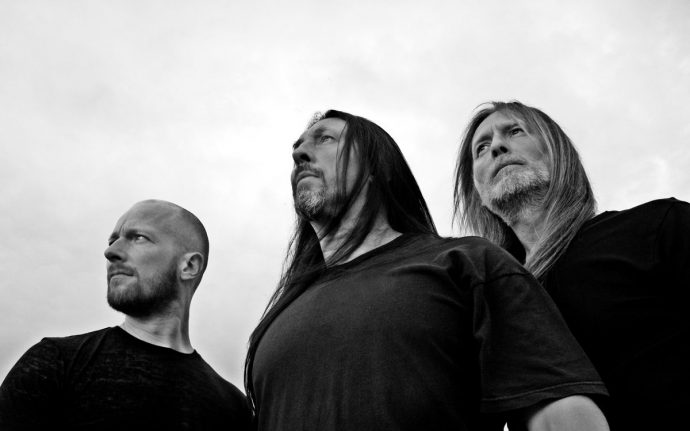
(We present Andy Synn’s review of the astonishing new opus from the genre-bending UK band Rannoch, which is set for release on May 25th.)
How does one measure ambition?
How do we quantify it and qualify it? How do we analyse and assess it? How do we judge whether one band’s ambition to be the heaviest/fastest/most technical is somehow inferior/superior to another band’s desire to cross-pollinate multiple styles and sub-genres to create something entirely new?
And what of those bands whose central ambition is simply to be the best that they can be and to write the best songs possible? Are they any less worthy than the band who just wrote an hour long, single-track, Prog-Metal odyssey?
All these questions, and more, were floating around my head while listening to the exceptional new album from Rannoch.

Clocking in at almost 70 dense, riff-driven minutes, Reflections Upon Darkness is an ambitiously structured and conceived record, far beyond anything which the group have previously attempted, which takes their established sound – equal parts Still Life-era Opeth and Nothin -period Meshuggah, along with a pronounced influence from Emperor/Ihsahn circa/post Prometheus… – and pushes it, stretches it, expands upon it, harder and further than ever before.
On the macro level the band’s progression and increased ambition is obvious – the entire second half of the record, for hell’s sake, is meant to be listened to as a single, 39-minute track – but there’s also just as much intriguing evolution to be observed on the micro scale, from the subtle use of electronic flourishes here and there to the increasingly authoritative and visceral delivery of vocalist/guitarist Ian Gillings, who switches between gargantuan growls, crooning harmonies, and portentous (some might say pretentious) spoken-word poetry, as and when the songs dictate.
But while the extravagant length and sheer density of this album certainly makes it more demanding (on your time if nothing else) than your average slab of generic metallic mayhem, especially since it’s so clearly meant to be listened to and experienced as a complete piece of work, the individual songs themselves are incredibly infectious and bombastic in their own right, and carefully designed to grab and retain your attention through every intricate twist and turn.
At times, particularly during the first half of the record, this ability to combine proggy extravagance and instantaneous intensity puts me in mind me of US Prog-Death wizards Allegaeon (although Rannoch are, in my estimation, an altogether darker, moodier, and heavier proposition), with whom they share a similar penchant for blending humongous grooves with explosions of blinding technicality (both Gillings and his co-guitarist Richard Page have clearly stepped up their game significantly in the intervening years since the band’s last release).
The devil, however, is definitely in the details, and while there’s a striking immediacy to the band’s music (as always), it’s only when you begin to really delve into the many layers of each track that you start to uncover all the distinctive and creative touches – from the scene-setting synth and symphonic embellishments which accentuate the nascent grandeur of “De Heptarchia Mystica”, to the ever-present undercurrent of moody melody which underpins “Despair”, to the eloquent light-and-shade songwriting which drives “The Hanged Man” – that make Reflections Upon Darkness such a uniquely captivating album.
Nowhere, of course, is this more clear than during the record’s second half, whose seven tracks – including the opening “Prelude” and the closing “Postlude” – have been written to serve as one continuous, interlinked piece of music which acts as a musical interpretation of Lord Byron’s infamously epic poem “Darkness”, whose apocalyptic, allegorical, and subtly heretical, themes make it a perfect fit for Rannoch’s particular brand of moody metallic menace.
“The Dream”, the first major “movement” of the album’s second half, injects the record with an added layer of bleak, blackened atmosphere (redolent of latter-day Emperor and/or early Ihsahn), while also laying the groundwork for certain rhythmic patterns and melodic refrains which the band will go on to reference and revisit throughout the rest of the “Darkness” suite, while “Hope” is a gigantic, but surprisingly succinct, piece of doom-laden, groove-heavy Progressive Death Metal that rolls over you with irresistible momentum.
“The Devoured”, by contrast, dispenses with the Death Metal side of things almost entirely, opting instead for a proggy slow-burn of sombre, clean-sung vocals and fluid, undulating fretwork (as well as some clever, brooding counterpoints courtesy of bassist Paul Lloyd), before building to an ominous, doomy climax which – following another welcome interjection of dramatic spoken-word vocals (whose presence throughout these tracks really helps tie the entire piece together) – transitions smoothly into the evocative strains of “Dying Embers”.
By this point, with everything that they’ve invested so far, it’s make-or-break time for the band (and the album). If they aren’t able to tie everything together with a fittingly powerful and poignant conclusion then, chances are, their audience are going to feel that the whole extravagant experiment of “Darkness” was, ultimately, an ambitious but ultimately unfulfilling failure.
But, thankfully, “Void” (which, even though it’s the album’s penultimate track, is clearly the record’s true finale) steps up to the plate and knocks it straight out of the park, delivering a veritable masterclass in dynamic, dramatic, devastatingly heavy Death Metal practically overflowing with stunning, spring-loaded riffs, monstrously intense vocals (harsh, clean, and everything in between), and complex-but-catchy hooks.
Now, lest you think that this review is simply all hype and no substance, it has to be said that the sheer scale of the band’s ambitions – which even I, as a long-time fan, failed to fully anticipate – means that, inevitably, some imperfections creep into the grand design now and then (mainly during the first half, where one or two of the more extreme transitions are, perhaps, not as smooth or as clean as they could be).
But, when viewed as part of the greater whole, these flaws actually serve to further accentuate the ridiculous scope of the group’s vision, hammering home the fact that the entirety of Reflections Upon Darkness is the product of just three people (aided and abetted of course by a suitably ferocious performance from infamous journeyman drummer Alex Micklewright).
It is, quite frankly, an astonishing achievement, front to back, warp and weft, warts and all, which deserves to be held up and highlighted right alongside the very best which this year has to offer.
BANDCAMP:
https://rannoch-uk.bandcamp.com/album/reflections-upon-darkness
FACEBOOK:
https://www.facebook.com/rannochband/

I am at full mast for this and cannot wait to hear the whole thing
FULL MAST! 🙂
You’re gonna need to be at full mast for two more days then, but you should really see a doctor after 4 hours 😉
BONERIFIC !
This is REALLY good! Looking forward to hearing it as a whole.